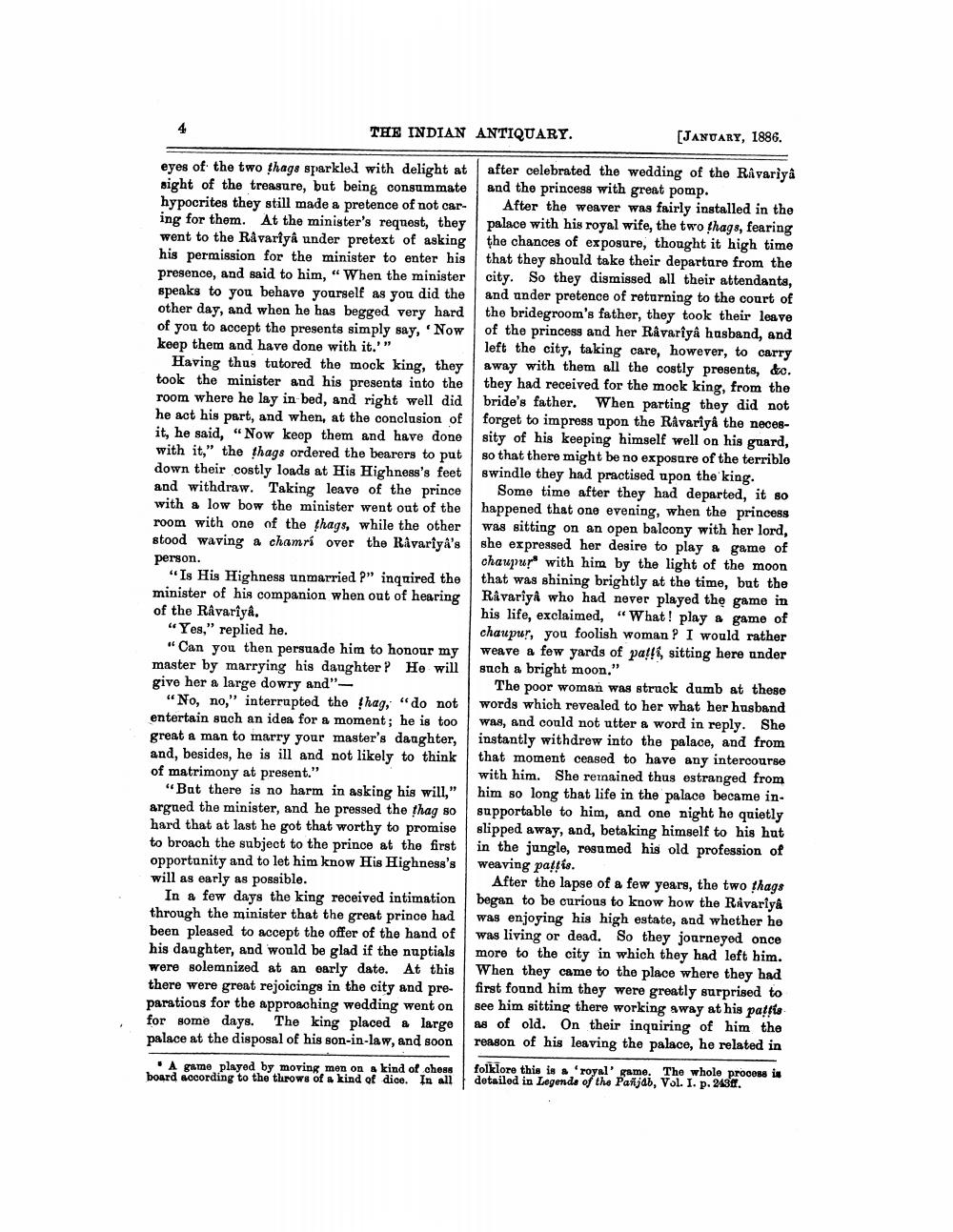________________
THE INDIAN ANTIQUARY.
eyes of the two thags sparkled with delight at sight of the treasure, but being consummate hypocrites they still made a pretence of not caring for them. At the minister's request, they went to the Ravariyâ under pretext of asking his permission for the minister to enter his presence, and said to him, "When the minister speaks to you behave yourself as you did the other day, and when he has begged very hard of you to accept the presents simply say, 'Now keep them and have done with it.'"
Having thus tutored the mock king, they took the minister and his presents into the room where he lay in bed, and right well did he act his part, and when, at the conclusion of it, he said, "Now keep them and have done with it," the thags ordered the bearers to put down their costly loads at His Highness's feet and withdraw. Taking leave of the prince with a low bow the minister went out of the room with one of the thags, while the other stood waving a chamri over the Ravariya's
person.
"Is His Highness unmarried ?" inquired the minister of his companion when out of hearing of the Râvarîyê.
"Yes," replied he.
"Can you then persuade him to honour my master by marrying his daughter? He will give her a large dowry and"
"No, no," interrupted the thag, "do not entertain such an idea for a moment; he is too great a man to marry your master's daughter, and, besides, he is ill and not likely to think of matrimony at present."
"But there is no harm in asking his will," argued the minister, and he pressed the thag so hard that at last he got that worthy to promise to broach the subject to the prince at the first opportunity and to let him know His Highness's will as early as possible.
In a few days the king received intimation through the minister that the great prince had been pleased to accept the offer of the hand of his daughter, and would be glad if the nuptials were solemnized at an early date. At this there were great rejoicings in the city and preparations for the approaching wedding went on for some days. The king placed a large palace at the disposal of his son-in-law, and soon
A game played by moving men on a kind of chess board according to the throws of a kind of dice. In all
[JANUARY, 1886. after celebrated the wedding of the Râvariya and the princess with great pomp.
After the weaver was fairly installed in the palace with his royal wife, the two thags, fearing the chances of exposure, thought it high time that they should take their departure from the city. So they dismissed all their attendants, and under pretence of returning to the court of the bridegroom's father, they took their leave of the princess and her Râvariyâ husband, and left the city, taking care, however, to carry away with them all the costly presents, &c. they had received for the mock king, from the bride's father. When parting they did not forget to impress upon the Ravariyâ the necessity of his keeping himself well on his guard, so that there might be no exposure of the terrible swindle they had practised upon the king.
Some time after they had departed, it so happened that one evening, when the princess was sitting on an open balcony with her lord, she expressed her desire to play a game of chaupurs with him by the light of the moon that was shining brightly at the time, but the Ravariya who had never played the game in his life, exclaimed, "What! play a game of chaupur, you foolish woman? I would rather weave a few yards of patți, sitting here under such a bright moon."
The poor woman was struck dumb at these words which revealed to her what her husband was, and could not utter a word in reply. She instantly withdrew into the palace, and from that moment ceased to have any intercourse with him. She remained thus estranged from him so long that life in the palace became insupportable to him, and one night he quietly slipped away, and, betaking himself to his hut in the jungle, resumed his old profession of weaving pattis.
After the lapse of a few years, the two thags began to be curious to know how the Rivariyâ was enjoying his high estate, and whether he was living or dead. So they journeyed once more to the city in which they had left him. When they came to the place where they had first found him they were greatly surprised to see him sitting there working away at his pattis as of old. On their inquiring of him the reason of his leaving the palace, he related in
folklore this is a 'royal' game. The whole process is detailed in Legends of the Pañjab, Vol. I. p. 243.




